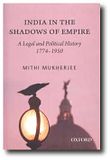India in the Shadows of Empire
Mukherjee, Mithi
India in the shadows of empire : a legal and political history, 1774-1950 / Mithi Mukherjee. - New Delhi : Oxford University Press, 2010. - xxxviii, 278 S.
ISBN 978-0-19-806250-9 / 0-19-806250-8
Rs. 695,00
US$ 15,11 (Eastern Book Corp.)
US$ 40,00 (inkl. Airmail) (Vedams)
DDC: 954.03
Beschreibung
This pioneering research offers a sweeping new interpretation of the complex and seemingly contradictory nature of Indian democracy and polity. In contrast to much of existing scholarship, it joins the colonial and postcolonial periods in Indian history into a seamless narrative.
This book explains the postcolonial Indian polity by presenting an alternative historical narrative of the British Empire in India and India’s struggle for independence. It pursues this narrative along two major trajectories.
On the one hand, it focuses on the role of imperial judicial institutions and practices in the making of both the British Empire and the anti-colonial movement under the Congress, with the lawyer as political leader. On the other hand, it offers a novel interpretation of Gandhi’s non-violent resistance movement as being different from the Congress. It shows that the Gandhian movement, as the most powerful force largely responsible for India’s independence, was anchored not in western discourses of political and legislative freedom but rather in Indic traditions of renunciative freedom, with the renouncer as leader.
This volume offers a comprehensive and new reinterpretation of the Indian Constitution in the light of this historical narrative. The book contends that the British colonial idea of justice and the Gandhian ethos of resistance have been the two competing and conflicting driving forces that have determined the nature and evolution of the Indian polity after independence. [Verlagsinformation]
Inhalt
Acknowledgements
Introduction
1. The Colonial and the imperial: India and Britain in the impeachment trial of warren Hastings
2. Conflict of sovereignty: The judiciary, the executive and the emergence of the Indian Legislative Council as a court of law
3. Into the labyrinth: The birth of justice as a discourse of governance
4. 'Vakil Raj': The Indian National Congress and the birth of the lawyer as political representative
5. From imperial justice to transcendental freedom: The Samnyasin as leader in the Movement for National Independence
6. An imperial constitution? : Justice as equity and the making of the Indian Constitution
7. India after independence: A tale of conflicting legacies
Bibliography
Index.
Autorin
MITHI MUKHERJEE, Assistant Professor, University of Colorado at Boulder. She teaches modern South Asian history and the history of law and human rights. Faculty profile. Homepage.
Quellen: Oxford University Press (India); Eastern Book Corp.; Vedams; WorldCat.
Ähnlich
- Llewellyn-Jones: Last King in India
- After Timur Left
- Sohi: Echoes of Mutiny
- Fischer-Tiné: Shyamji Krishnavarma
- Soldat Ram Singh und der Kaiser
- India and Europe in the Global Eighteenth Century
- Biedermann: The Portuguese in Sri Lanka and South India
- Cederlöf: Founding an Empire on India's North-Eastern Frontiers
- Kingship in Kaśmīr (AD 1148–1459)
- Czaja: Medieval Rule in Tibet

